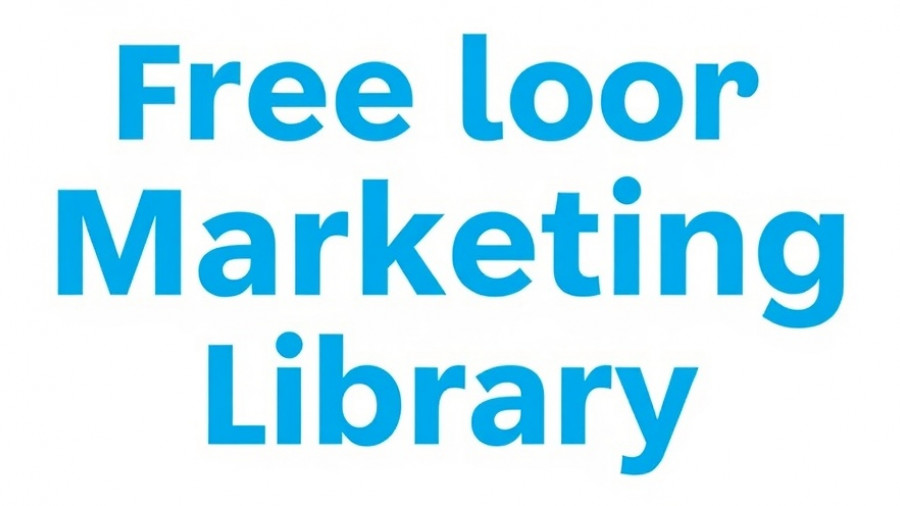
Understanding the Evolution of Marketing: Inbound vs. Loop
With the rapid advancements in technology and changing consumer behavior, understanding how to market effectively is crucial for small and medium-sized businesses. Enter Loop marketing—a new paradigm that enhances traditional inbound marketing methods by integrating artificial intelligence (AI) and a continuous cycle of engagement. Unlike the linear structure of inbound marketing, Loop marketing creates a cycle of Express, Tailor, Amplify, and Evolve, allowing businesses to adapt in real time. This article will break down the distinctions between these two methodologies and how they can work hand-in-hand to bolster your marketing efforts.
The Basics of Inbound Marketing
Inbound marketing has long been a reliable framework for businesses aiming to engage potential customers through valuable content. It operates on a straightforward linear funnel: Attracting, Converting, Closing, and Delighting customers. This model emphasizes creating content that addresses the needs and interests of your audience, bringing them into your business organically. However, with the rise of AI-driven platforms and changing consumer behavior—such as individuals seeking immediate answers through chatbots—this model now requires an update.
The Loop Marketing Framework Explained
Loop marketing positions itself as a progressive evolution of inbound methodologies. Created by HubSpot, it addresses modern-day marketing challenges through its four continuous stages:
- Express: Establish your brand's identity clearly, ensuring consistency in voice and tone.
- Tailor: Utilize unified customer data to deliver personalized messaging that resonates with your audience.
- Amplify: Distribute your content effectively across various channels to meet consumers where they are.
- Evolve: Implement continuous improvement by utilizing real-time insights and analytics to optimize strategies.
This cycle of engagement ensures that each marketing effort builds on the last, fostering rapid growth and adaptation, essential in an era where 60% of Google searches end without clicks.
Why Loop Marketing Complements Inbound
Loop marketing does not seek to replace inbound marketing but rather enhance its foundation by incorporating efficient AI-driven strategies. For instance, while inbound marketing focuses on creating valuable content, Loop marketing places equal emphasis on continuous adaptation and personalized audience experiences. This synergy allows businesses to maintain authenticity while leveraging technology to scale their efforts effectively.
Leveraging AI to Boost Marketing Strategies
AI plays a pivotal role in the Loop marketing framework. It enables businesses to understand customer behaviors better and tailor content based on individual needs and preferences. With tools that analyze engagement metrics and real-time insights, marketers can generate personalized campaigns that reach customers at the right time and place. For small and medium businesses, these dynamic capabilities mean staying competitive in a rapidly evolving market.
Implementing Loop Marketing Effectively
Transitioning to Loop marketing can feel daunting, but it's essential to integrate these techniques progressively. Begin by identifying which stage of the loop addresses your business's most significant challenge. Are you struggling with content creation? Start with the Express stage to clarify your brand voice. If personalization is lacking, the Tailor stage would be your next focus. The flexibility of the Loop method allows businesses to adapt their strategy without overhauling their existing frameworks.
Statistical Insights: The Impact of Loop Marketing
Companies that have adopted Loop marketing principles have seen promising results. For instance, Morehouse College reported optimizing over 900 pages with AI while preserving their authentic brand voice. Kelly Services noted a 32% rise in site users and a 26% increase in sessions through personalized marketing tactics. These statistics illustrate the tangible benefits of integrating Loop marketing into existing inbound strategies.
Conclusion: The Future of Marketing is Here
As small and medium-sized businesses navigate the complexities of the marketing landscape, it’s crucial to adapt to the evolving landscape shaped by AI and consumer expectations. Loop marketing offers a compelling way to enhance inbound strategies through continuous engagement and personalization. By embracing both methodologies, businesses can set themselves up for sustainable growth and success. It's time to revolutionize your marketing approach—consider integrating aspects of Loop marketing today to stay ahead of the curve.
Want to learn more about implementing effective marketing strategies? Stay informed and proactive in exploring new trends that can enhance your business.
 Add Row
Add Row  Add
Add 



Write A Comment